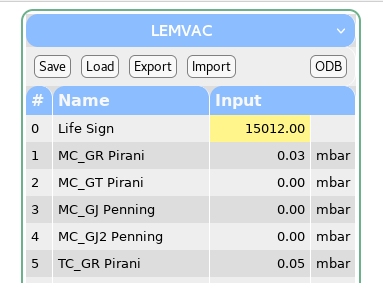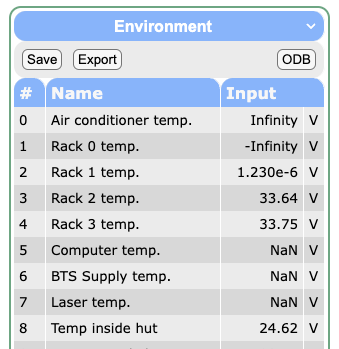| ID |
Date |
Author |
Topic |
Subject |
|
2587
|
16 Aug 2023 |
Konstantin Olchanski | Bug Report | excessive logging of http requests |
> > Our default configuration of apache httpd logs every request.
> > MIDAS custom web pages can easily make a huge number of RPC calls creating a
> > huge log file and filling system disk to 100% capacity.
added "daily" to /etc/logrotate.d/httpd, default was "weekly", not often enough.
K.O. |
|
2588
|
16 Aug 2023 |
Stefan Ritt | Bug Report | Error accessing history files |
Tonight we got another error of that type after the update:
04:17 - [mhttpd,ERROR] [history_schema.cxx:2913:FileHistory::read_data,ERROR] Cannot read
'/data2/history/mhf_1692128214_20230815_gassystem.dat', read() errno 2 (No such file or directory)
This morning I looked at the file, and it was there:
[meg@megon02 history]$ ls -alg mhf_1692128214_20230815_gassystem.dat
-rw-rw-r--. 1 meg 4663228 Aug 17 08:50 mhf_1692128214_20230815_gassystem.dat
[meg@megon02 history]$
Stefan |
|
2589
|
17 Aug 2023 |
Stefan Ritt | Bug Report | midas wants to show notification? |
> > This feature was asked by some people ...
>
> "show notifications" popups are strongly associated with disreputable web sites (presumably to
> push spam), it was surprising to see it from midas.
>
> K.O.
I agree. But unlike emails (where you get lots of spam as well), you can nicely blacklist/whitelist
desktop notifications. I suppress all of them except the one for MIDAS. This allows me to watch our
experiment without staring on the web page all the time.
The main question here is maybe if the desktop notification should be on or off by default (for a
fresh browser). While you always can change that via the mhttpd "Config" page, the default value is
chosen by the system. I thought I put it to "on" so people can experience it, and then turn it off if
they don't like. Having them off by default, most people never would notice this possibility. But I'm
open to a discussion here.
Stefan |
|
2591
|
17 Aug 2023 |
Konstantin Olchanski | Bug Report | Error accessing history files |
Confirmed. The error message is wrong. It is printed after a short read(), but short read() does not
set errno, and errno reported by the error message is from some previous syscall. Corrected error
message is already committed. K.O.
> Tonight we got another error of that type after the update:
>
> 04:17 - [mhttpd,ERROR] [history_schema.cxx:2913:FileHistory::read_data,ERROR] Cannot read
> '/data2/history/mhf_1692128214_20230815_gassystem.dat', read() errno 2 (No such file or directory)
>
> This morning I looked at the file, and it was there:
>
> [meg@megon02 history]$ ls -alg mhf_1692128214_20230815_gassystem.dat
> -rw-rw-r--. 1 meg 4663228 Aug 17 08:50 mhf_1692128214_20230815_gassystem.dat
> [meg@megon02 history]$
>
>
> Stefan |
|
2592
|
17 Aug 2023 |
Konstantin Olchanski | Bug Report | excessive logging of http requests |
> > > Our default configuration of apache httpd logs every request.
> > > MIDAS custom web pages can easily make a huge number of RPC calls creating a
> > > huge log file and filling system disk to 100% capacity.
> added "daily" to /etc/logrotate.d/httpd, default was "weekly", not often enough.
this should fix it good, make /var/log bigger:
[root@mpmt-test ~]# df
Filesystem 1K-blocks Used Available Use% Mounted on
/dev/sdc2 52403200 52296356 106844 100% /
[root@mpmt-test ~]#
[root@mpmt-test ~]# xfs_growfs /
data blocks changed from 13107200 to 106367750
[root@mpmt-test ~]#
[root@mpmt-test ~]# df
Filesystem 1K-blocks Used Available Use% Mounted on
/dev/sdc2 425445400 52300264 373145136 13% /
K.O. |
|
2593
|
19 Aug 2023 |
Stefan Ritt | Bug Report | Error accessing history files |
Still get the same error with the latest version:
3:28 [mhttpd,ERROR] [history_schema.cxx:2913:FileHistory::read_data,ERROR] Cannot read
'/data2/history/mhf_1692391703_20230818_hv_tc.dat', read() errno 2 (No such file or directory)
Stefan |
|
2606
|
19 Sep 2023 |
Frederik Wauters | Bug Report | epics fe "Start Command" |
The epics frontend overwrites the "start command" odb after each start:
// set start command in ODB
midas::odb efe("/Programs/EPICS Frontend");
std::string p(__FILE__);
std::string s("build/epics_fe");
auto i = p.find("epics_fe.cxx");
p.replace(i, s.length(), s);
p = p.substr(0, i + s.length());
efe["Start command"].set_string_size(p, 256);
this should be set such that it only writes when the key is not there. It causes the following issue: on a pc with multiple experiments defined, you need to start the fe's with a "-e <name>" flag. |
|
2607
|
20 Sep 2023 |
Stefan Ritt | Bug Report | epics fe "Start Command" |
Thanks for reporting this problem. It has been fixed today, so the start command is only written if it's emtpy.
Stefan |
|
2611
|
30 Sep 2023 |
Gennaro Tortone | Bug Report | ODB page and hex values |
Hi,
I was playing with MIDAS devel branch and I realized that
if I set an ODB INT32 key to a value using new ODB web interface
it is reported in parenthesis always as (0xFFFFFFFF);
I tested with different browser and result is the same while this
never happens in OldODB web interface...
Cheers,
Gennaro |
| Attachment 1: 10.png
|

|
|
2612
|
01 Oct 2023 |
Stefan Ritt | Bug Report | ODB page and hex values |
Thanks for reporting this bug, I fixed it in the last commit.
Best,
Stefan |
|
2613
|
03 Oct 2023 |
Gennaro Tortone | Bug Report | Python midas.file_reader get_eor_odb_dump() |
Hi,
the method get_eor_odb_dump() of midas.file_reader does not contain an
initial jump_to_start() and this is a problem if the following access
pattern is used:
---
mfile = midas.file_reader.MidasFile("run00008.mid.lz4")
begin_odb = mfile.get_bor_odb_dump().data
# loop on data events
...
end_odb = mfile.get_eor_odb_dump().data
---
in this case the script ends with a RuntimeError (Unable to find EOR event) and
force user to do a manual mfile.jump_to_start() before mfile.get_eor_odb_dump();
Thanks,
Gennaro |
|
2615
|
06 Oct 2023 |
Konstantin Olchanski | Bug Report | Error accessing history files |
> Still get the same error with the latest version:
> 3:28 [mhttpd,ERROR] [history_schema.cxx:2913:FileHistory::read_data,ERROR] Cannot read
> '/data2/history/mhf_1692391703_20230818_hv_tc.dat', read() errno 2 (No such file or directory)
I figured it out. I claim defense of temporary insanity and old age senility.
1) I added the "short read" check in one place, missed the second place
2) writes of history were meant to be atomic, and they are atomic in my head, but not in the midas
code:
history_schema.cxx:HsFileSchema::write_event()
...
status = write(s->writer_fd, &t, 4);
if (status != 4) {
cm_msg(MERROR, "FileHistory::write_event", "Cannot write to \'%s\', write(timestamp) errno
%d (%s)", s->file_name.c_str(), errno, strerror(errno));
return HS_FILE_ERROR;
}
status = write(s->writer_fd, data, expected_size);
if (status != expected_size) {
cm_msg(MERROR, "FileHistory::write_event", "Cannot write to \'%s\', write(%d) errno %d
(%s)", s->file_name.c_str(), data_size, errno, strerror(errno));
return HS_FILE_ERROR;
}
...
that's not atomic, that's two separate writes. history reader hits the history file between the
two writes and gets a short read of 4 bytes timestamp instead of full record size. that's the
error message reported by mhttpd.
two fixes forthcoming:
a) check for short read in the 2nd place that I missed
b) two write() are replaced by 2 memcpy() to a preallocated buffer and 1 write()
Overall, I am pretty happy that this is the only bug in the FILE history code found in N years,
and it does not even cause data corruption...
K.O. |
|
2616
|
06 Oct 2023 |
Konstantin Olchanski | Bug Report | Error accessing history files |
> two fixes forthcoming:
> a) check for short read in the 2nd place that I missed
> b) two write() are replaced by 2 memcpy() to a preallocated buffer and 1 write()
commit 713ec4a583365d57ffcd700ceeb09dcc14518295
K.O. |
|
2621
|
16 Oct 2023 |
Ben Smith | Bug Report | Python midas.file_reader get_eor_odb_dump() |
Thanks for the bug report Gennaro!
I've fixed the code so that we'll now find the end-of-run ODB dump even if the user is already at the end of the file when they call get_eor_odb_dump().
Ben |
|
2655
|
12 Dec 2023 |
Zaher Salman | Bug Report | Compilation error on RPi |
Hello,
Since commit bc227a8a34def271a598c0200ca30d73223c3373 I've been getting the compilation error below (on a Raspberry Pi 3 Model B Plus Rev 1.3).
The fix is obvious from the reported error, but I am wondering whether this should be fixed in the main git??
Thanks,
Zaher
[ 7%] Building CXX object CMakeFiles/objlib.dir/src/json_paste.cxx.o
/home/nemu/nemu/tmidas/midas/src/json_paste.cxx: In function ‘int GetQWORD(const MJsonNode*
, const char*, UINT64*)’:
/home/nemu/nemu/tmidas/midas/src/json_paste.cxx:324:19: error: ‘const class MJsonNode’ has
no member named ‘GetLL’; did you mean ‘GetInt’?
*qw = node->GetLL();
^~~~~
GetInt
make[2]: *** [CMakeFiles/objlib.dir/build.make:271: CMakeFiles/objlib.dir/src/json_paste.cx
|
|
2658
|
14 Dec 2023 |
Zaher Salman | Bug Report | Compilation error on RPi |
This issue was resolved thanks to Konstantin and Stefan. I simply had to update submodules:
git submodule update
and then recompile.
Zaher |
|
2662
|
29 Dec 2023 |
Konstantin Olchanski | Bug Report | Compilation error on RPi |
> git pull
> git submodule update
confirmed. just run into this myself. I think "make" should warn about out of
date git modules. Also check that the build git version is tagged with "-dirty".
K.O. |
|
2665
|
03 Jan 2024 |
Stefan Ritt | Bug Report | Compilation error on RPi |
> > git pull
> > git submodule update
>
> confirmed. just run into this myself. I think "make" should warn about out of
> date git modules. Also check that the build git version is tagged with "-dirty".
>
> K.O.
The submodule business becomes kind of annoying. I updated the documentation at
https://daq00.triumf.ca/MidasWiki/index.php/Quickstart_Linux#MIDAS_Package_Installatio
n
to tell people to use
1) "git clone ... --recurse-submodules" during the first clone
2) "git submodule update --init --recursive" in case they forgot 1)
3) "git pull --recurse-submodules" for each update or to use
4) "git config submodule.recurse true" to make the --recurse-submodules the default
I use 4) since a while and it works nicely, so one does not have to remember to pull
recursively each time.
Stefan |
|
2674
|
17 Jan 2024 |
Andreas Suter | Bug Report | mhttpd eqtable |
Hi,
I like the new eqtable, but stumbled over some issues.
1) In the attached snapshot you see that the values shown from our vacuum Pirani and Penning cells are all zero, which of course is not true.
It would be nice to have under the equipment settings some formatting options, like the possibility to add units.
2) If one of the number evaluates to Infinity, the table is not shown properly anymore.
Best,
Andreas |
| Attachment 1: midas-eqtable.png
|

|
|
2675
|
17 Jan 2024 |
Stefan Ritt | Bug Report | mhttpd eqtable |
> 1) In the attached snapshot you see that the values shown from our vacuum Pirani and Penning cells are all zero, which of course is not true.
> It would be nice to have under the equipment settings some formatting options, like the possibility to add units.
You have a
/Equipment/LEMVAC/Settings/Format Input
array where you can specify the format for every value. Default is "%f2" for two digits after the period. For vacuum levels you might want to
consider "%e3" which give you exponential format with three significant digits. The "format" setting is described at
https://daq00.triumf.ca/MidasWiki/index.php//Equipment_ODB_tree#Format_%3Cvariable%3E
and the details are at
https://daq00.triumf.ca/MidasWiki/index.php/Custom_Page#Formatting
The was a bug with the format handling, so please pull the current develop branch.
> 2) If one of the number evaluates to Infinity, the table is not shown properly anymore.
I fixed that as well in the current version.
Best,
Stefan |
| Attachment 1: Screenshot_2024-01-17_at_14.09.30.png
|

|